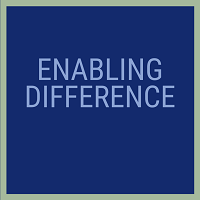Continuing to Enable Difference - Where Do We Go From Here?
Published by: WCET | 9/3/2021
Published by: WCET | 9/3/2021
Today’s post from Chantae Recasner, Dean, Academic Success with Northeast Lakeview College – Alamo Colleges District and the WCET Steering Committee working group on Diversity, Equity, and Inclusion, who joins us to close out the Frontiers series started at the beginning of this month on “Enabling Difference.”
During the month of August, members of this working group shared their advice, strategies, and research regarding equity and inclusion in higher education digital learning. As Chantae confirms below, this isn’t the end of WCET’s work on diversity and inclusion in higher education, but just the start. 
Stay tuned to learn more about our work in the future.
Thank you again to our WCET leadership for your outstanding work with us on this topic and your dedication to improving the educational experiences for all of our students.
Enjoy the read,
Lindsey Downs, WCET
This month’s examination of diversity, equity and inclusion has been but one example of how WCET is invested in living its values and engaging the expressed concerns and interests of its members. Our theme of “Enabling Difference” was intended to inspire openness about how we approach DEI challenges and aspirations as individual professionals and organizations.
From conceptualization of terms to strategic planning, from data analysis to eliminating barriers in tech, this series offered members a place to start, a place to re-engage, a place to re-consider. While the month has ended, DEI engagement for the WCET Steering Committee, the DEI Workgroup, and all of you does not and should not stop here.
As we wrap up this series, Hurricane Ida is raging through Louisiana—a triggering moment for anyone who, like me, has experienced trauma associate with natural disasters, especially hurricanes. In many ways, the nested realities of a natural disaster amidst a global pandemic is yet another provocateur of debates about access. As I write this, the entire city of New Orleans is without power. What an apropos description of a city where the majority of its residents identify as members of a historically minoritized group, less than 50% have earned a higher education credential, and the average person earns about $35K a year. My house in San Antonio is currently occupied by family who evacuated from my hometown of New Orleans in search of safety, and my mind is now overrun with thoughts of how safety and recovery are intimately connected to equity and justice.
16 years ago, in the wake of Hurricane Katrina, we saw stimulation of the digital marketplace in higher education as many colleges and universities across the country enabled online course offerings in partnership with those campuses most victimized by the storm. Thus, online learning as emergency response was not a new idea when leaders gathered to determine how we would continue instruction in the wake of the COVID-19 pandemic. Systemic inequities can indeed seem most evident during moments of great distress, but they also manifest in micro-moments that distress individuals greatly.
My point here is that from the microaggression to the natural disaster, we are literally still navigating recovery strategies from historic inequities and building preparedness strategies as safeguards against future injustice. As we learned from the “Closer Conversation” on Friday, many of us are doing great work in our personal lives and at/with our institutions, but the challenges are varied if not vast. Are our different lived experiences enabling common conceptualizations of equity, equality, justice, inclusion? No. But, it is in the drudges of critical, courageous, brave, safe conversations that we at least build collective will to pursue the ideal, if not robust and clear strategy.
So where do we go from here? The best lesson I ever learned in instructional design was that well designed instruction is iterative. We look back to learn where to clear paths and innovate for higher achievement and for greater learning. Our journey toward creating greater access and equity in higher education in general and digital integration specifically is contingent upon our collective willingness to identify, value, and empower difference.
As Tina Parscal and Van Davis acknowledged, “…erasing equity issues at our institutions is everyone’s job,” and we press forward ever mindful of Janelle Elias’s counsel that “planning to plan is a critical part of centering DEI work.” In other words, we will never be able to “change some experiences for all students” and provide what Adam Cota described as “personalization at scale” if we fail to plan and then refuse to act. We should find comfort in taking a chance at doing it differently, thinking about it differently, and assessing it differently because there is no true failure in operating with the intention to increase access and eliminate inequity. If the concept of iteration holds, then we will continue to grow as we go. Thus, as Anna Porcaro exclaimed, “Educators have a responsibility — and really an exciting opportunity — to identify and remove as many [barriers] as they can as they build and revise online courses.”
“…what happens in the world impacts the classroom and what happens in the classroom impacts the world.“
I would extend the vision of that impact opportunity beyond the course itself. If classrooms are but microcosms of our world(s), then the symbiotic influence holds—what happens in the world impacts the classroom and what happens in the classroom impacts the world.
So, let’s keep talking, planning, and doing. WCET would like to thank all you for engaging the blog series this month, and we invite you to continue the conversations with us and among your colleagues.
Immediate Past Chair, Steering Committee, WCET Executive Council, Interim President, Seattle Central College